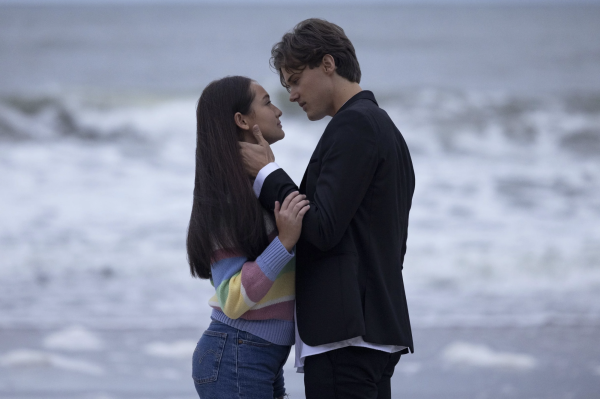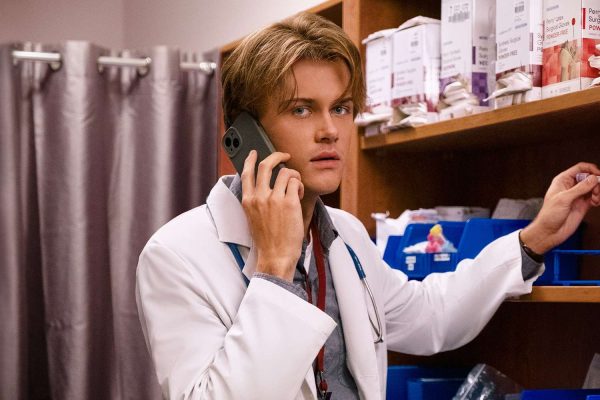Amazon Prime TV’s adaptation of author Jenny Han’s “The Summer I Turned Pretty” book series didn’t take over the world at first. While Seasons 1 and 2 performed relatively well, they didn’t attract the vast numbers that other young adult romance shows have drawn.
That was until Season 3 premiered this summer, when the show suddenly became the talk of the internet. TikTok users debriefed each new episode as they dropped every Wednesday, offering hot takes about the characters and, of course, discussions on which love interest was the better choice.
However, with the final episode airing just last week, the final season of “The Summer I Turned Pretty” showcases what makes it both a heartwarming yet heart wrenching watch, despite reminding the viewer of how infuriating it is at the same time.
The overarching story of the show revolves around a girl named Isabel – nicknamed ‘Belly’ – played by Lola Tung, who spends every summer at a mutual friends’ home with her family. Ever since she was little, she harbored feelings for the eldest brother, Conrad, portrayed by Christopher Briney.
After Belly earned a sense of confidence and traded her glasses for contacts, it was finally the summer she turned pretty. While Conrad noticed her more, it was then that she also started to catch feelings for his younger brother, Jeremiah, played by Gavin Casalegno.

This season finds our characters in their final year of college, as they transition into adulthood. Feelings resurface and tensions rise, as Belly is set to marry Jeremiah.
Stuck between her old love for Conrad and the promise to love Jeremiah forever, Belly must choose the next step toward her future.
What makes the story both easy to get caught up in and frustrating is the unusual pacing of the season as a whole. This is a problem the show has had since Season 1, but it has been especially pronounced during the latest season.
Since modern shows today have longer episodes but shorter seasons, the speed and timing of key events in the story must be planned more carefully, and this season was not that well planned when it came to pacing.
The seasons employ numerous time-skips in the story to expedite character dynamics and growth. The season starts with a four-year time skip from the end of Season 2, and both episodes 10 and 11 feature year-long time skips.
This would not be so bad if the moments in the present were all meaningful, but that’s not always the case.
Oftentimes, large chunks of episodes are spent on side plots with other characters, and while endearing in the moment, each side plot fails to add anything worthwhile to the larger plot. When there are so few episodes, there is less time to explore the main plot entirely.

In other instances, it often feels like the writers are trying to cram too much into one episode, leaving the viewer exhausted and annoyed. While it might be nice to spend some time exploring the relationship between Belly’s best friend, Taylor (Rain Spencer), with her family drama, or the troubled relationship between Jeremiah and his dad, there is no time left to flesh out each subplot.
Whatever time the story spends on the side plots means the show now has less time to spend fleshing out the core drama between the brothers and Belly. This comes to an end in the latter half of the series when characters start making rash decisions that change relationship dynamics on a whim.
These problems come to a head in episodes 9 through 11. The show takes a sharp turn, making it appear as if two shows are playing at the same time. Now, both the subplots and the main plot feel neither tight nor fully fleshed out, so the viewer never feels truly immersed.
However, it’s hard not to get immersed in the world of the show just by looking at it visually. Most of the show takes place in the fictional town of Cousins Beach.
If there is one thing the show consistently does right, it is showcasing the beauty of summer along the East Coast, from wide, sweeping shots of the beach that catch the sunlight hitting the ocean to tight shots that showcase the iconic summer house. Everything about the show’s production design screams summer.

Yet the show does make it hard to be fully immersed in the calm shores of Cousins Beach, as the show is somewhat infamous for its many needledrops. Artists such as Olivia Rodrigo, Sabrina Carpenter, and even multiple Taylor Swift songs are playing per episode.
While using popular music is par for the course for a teen show, “The Summer I Turned Pretty” is too trigger-happy with the music it uses. These songs are frequently played back-to-back, with some only playing upwards of 20 seconds.
While some of these are played over party scenes or montages, some are played over dramatic, pivotal scenes. The use of many trendy songs make it difficult to get into the drama of a fight or love confession when Billie Eilish is singing softly in the background during the dialogue.
RELATED: ‘Man’s Best Friend’ is a chronically single girl’s best friend
The music is often on the nose, playing songs that serve as a form of inner dialogue. While effective sometimes, it can take the viewer out of the moment, as they realize what popular song is playing over the scene.
What saves the bad pacing and dialogue – ranging from heavy-handed to cringeworthy – is the acting.
Each actor is on their A-game, giving each character a sense of humanity that makes them endearing and easier to understand. Jackie Chung gives a stern, yet loving, performance as Belly’s mom Laurel, while Sean Kaufman performs a perfect blend of snarky and caring as Steven, Belly’s brother.
Christopher Briney’s performance as Conrad is the star of the show. Briney can showcase a sense of yearning and softness in his scenes with Tung, as the two fight through the tension of trying to figure out their feelings.
Briney’s ability to showcase moments of anxious thought through the character of Conrad helps add to his amazing character development. The viewer understands why Conrad acts and feels the way he does, without him ever saying it outright. Briney uses small hand gestures, or fidgets with his clothing, whenever Conrad feels nervous. Or the way he uses his eyes to look at Belly, the viewer can sense what Conrad is meant to be feeling in any given moment. Even when he chooses to add a voice crack or speak softly, the subtlety provides more depth to Conrad as a character.

It is the acting that brings the heart of the story to life, and that’s the best way to explain what makes “The Summer I Turned Pretty” so special. It has such a good heart.
While romance is a key part of the show’s identity and story, the show is a charming, yet somewhat uneven, coming-of-age tale. It’s about a young woman discovering herself, figuring out what she wants for her future and learning who she truly is and what she is capable of.
It’s true that the show has many issues; its characters are not the most realistic and are annoying at times, the writing feels rushed and an ever-increasing tracklist of songs derails numerous scenes.
Yet even when it falls flat, the show remains engaging because it all comes from a place of sincerity.
Growing up is never easy; mistakes will be made and lessons will be learned. However, as someone embraces change, they can also embrace the hopes and wonders of their past to meet a future that feels as freeing as a cool summer breeze.





































































































































